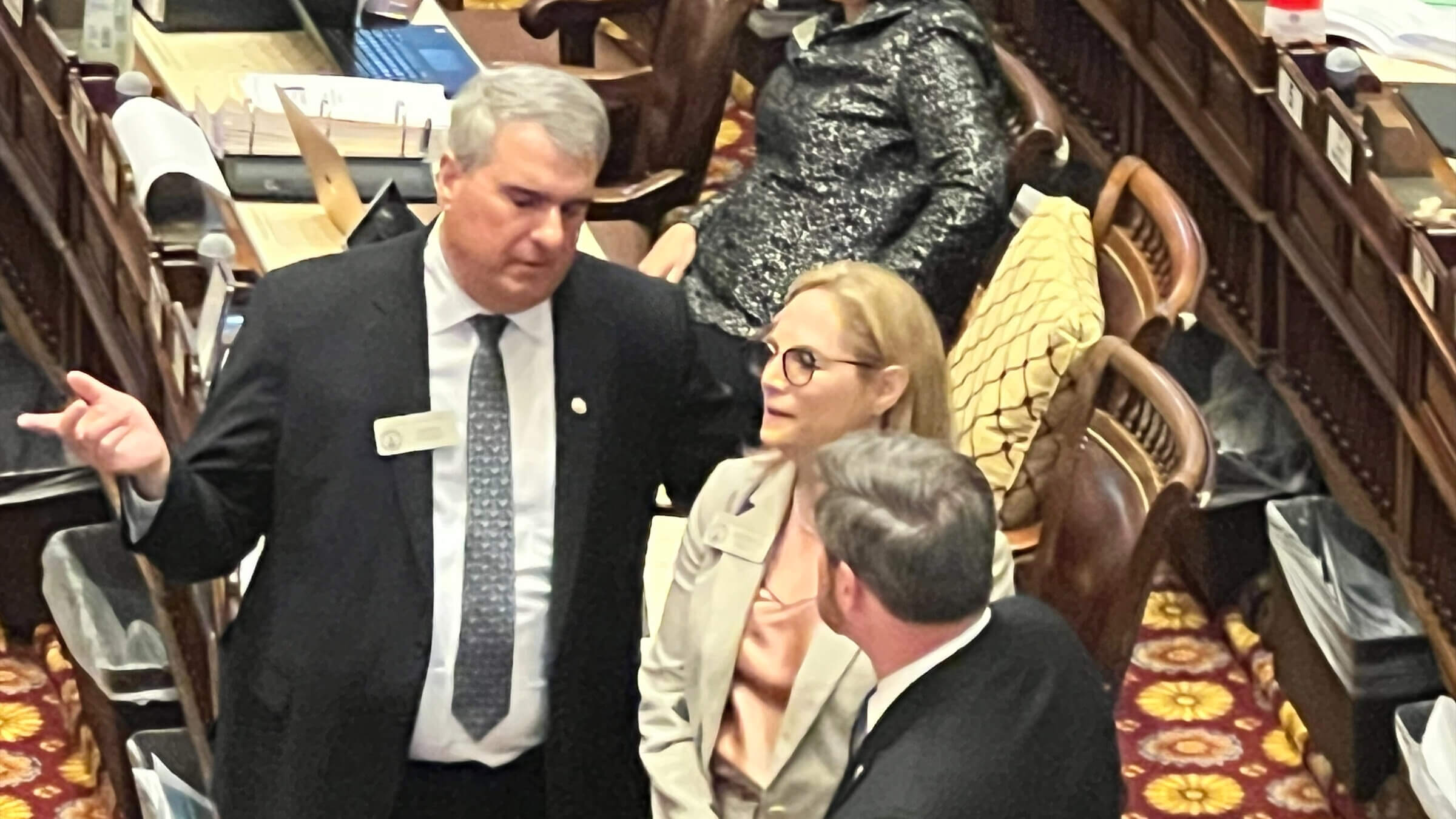Georgia’s Jewish legislator promises to keep fighting after antisemitism bill fails to come up for a vote
The bill, which would codify an official definition of antisemitism, could be before the Senate again in January

Georgia state Rep. Esther Panitch, center. Photo by Cheryl Dorchinsky
A much-discussed bill that would codify a definition of antisemitism into Georgia state law was not passed before the state assembly’s term ended, but the state’s lone Jewish legislator said she hasn’t given up hope.
In early March, the bill, which would see Georgia adopt the International Holocaust Remembrance Alliance’s definition of antisemitism, was overwhelmingly approved by the state House of Representatives. At the time, Democrat Esther Panitch, a Jewish woman and one of the bill’s sponsors, said she had no reason to believe the bill wouldn’t pass through the Senate.
But the Senate had not voted on the bill by the end of Wednesday, which marked the end of the assembly’s term.
“For the second year in a row, the Senate has ignored the cries of the Jewish community who are under attack,” Panitch told the Forward on Thursday. “And there’s no reason why. The lieutenant governor said it was an issue of public importance when he revised the bill and then failed to call it up even though it was 100% within his control.”
Over the past few weeks, the bill had been the subject of legislative jockeying as the Senate’s judiciary committee voted to amend its definition of antisemitism. At the time, Lt. Gov. Burt Jones worked to get the original wording of the bill in front of the Senate, with one senator saying Jones saw the bill as “an issue of public importance.”
Panitch said it was unclear why the bill was never called for a vote, saying she had received no direct communication from Jones on the matter. She said that her colleagues in the House were ready to take the bill back for another vote, a parliamentary procedure made necessary by an amendment made in the Senate.
A call to Jones’ office for comment was not immediately returned.
Panitch stressed that the bill, which received bipartisan support within the House, had enough votes lined up in the Senate to pass.
The bill had been criticized for its use of the IHRA definition, which some allege can be used to crack down on free speech. But its proponents have pointed to language within the bill that assures respect for everyone’s First Amendment rights.
The bill will not be up for consideration again until the next legislative session begins in January. Because that falls within the current two-year legislative cycle, it would not have to go through the House again before being considered by the Senate. Panitch said she plans to spend the time in the interim strategizing with colleagues and informing her political colleagues of the concerns of Georgia’s Jews.
“My hope is that nothing worse happens to the Jewish community in the interim, because right now we don’t have the same protections as other minorities,” said Panitch, who, along with hundreds of other Jewish households, was the recipient of antisemitic flyers in February.
Those who harm Jews end up in history’s dustbin. HB144 made it easier to identify them, although more recently, they have outed themselves. The far right tells us to go to Israel; the far left wants to destroy Israel. Neither will prevail. #GAIHRA2024 #gapol @rep_johncarson
— Esther Panitch (@epanitch) March 30, 2023
The bill’s original vote occurred on the eve of Purim, while the current session ended a week before Passover. Panitch said the timing hadn’t occurred to her — “I’m dreading that it’s Pesach in a week and I haven’t done any shopping yet” — but said that it, too, harkens to familiar themes.
“Once again, Jews are fighting to be recognized as equals in terms of protection, and we’re going to keep fighting. Anyone who’s tried to harm Jews has always ended up relegated to the dustbin of history, and we’ll be back and we will prevail.”
The Forward is free to read, but it isn’t free to produce

I hope you appreciated this article. Before you go, I’d like to ask you to please support the Forward.
Now more than ever, American Jews need independent news they can trust, with reporting driven by truth, not ideology. We serve you, not any ideological agenda.
At a time when other newsrooms are closing or cutting back, the Forward has removed its paywall and invested additional resources to report on the ground from Israel and around the U.S. on the impact of the war, rising antisemitism and polarized discourse.
This is a great time to support independent Jewish journalism you rely on. Make a gift today!
— Rachel Fishman Feddersen, Publisher and CEO
Support our mission to tell the Jewish story fully and fairly.
Most Popular
- 1

Fast Forward Ye debuts ‘Heil Hitler’ music video that includes a sample of a Hitler speech
- 2

Opinion It looks like Israel totally underestimated Trump
- 3

Culture Is Pope Leo Jewish? Ask his distant cousins — like me
- 4

Fast Forward Student suspended for ‘F— the Jews’ video defends himself on antisemitic podcast
In Case You Missed It
-

News In Edan Alexander’s hometown in New Jersey, months of fear and anguish give way to joy and relief
-

Fast Forward What’s next for suspended student who posted ‘F— the Jews’ video? An alt-right media tour
-

Opinion Despite Netanyahu, Edan Alexander is finally free
-

Opinion A judge just released another pro-Palestinian activist. Here’s why that’s good for the Jews
-
Shop the Forward Store
100% of profits support our journalism
Republish This Story
Please read before republishing
We’re happy to make this story available to republish for free, unless it originated with JTA, Haaretz or another publication (as indicated on the article) and as long as you follow our guidelines.
You must comply with the following:
- Credit the Forward
- Retain our pixel
- Preserve our canonical link in Google search
- Add a noindex tag in Google search
See our full guidelines for more information, and this guide for detail about canonical URLs.
To republish, copy the HTML by clicking on the yellow button to the right; it includes our tracking pixel, all paragraph styles and hyperlinks, the author byline and credit to the Forward. It does not include images; to avoid copyright violations, you must add them manually, following our guidelines. Please email us at [email protected], subject line “republish,” with any questions or to let us know what stories you’re picking up.















